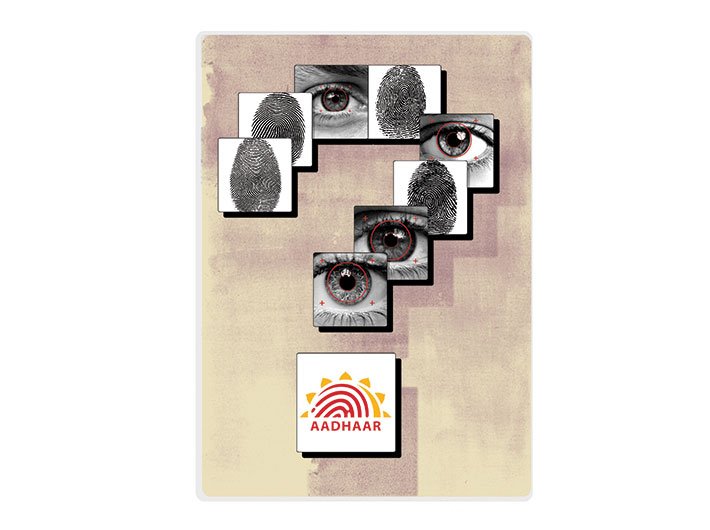The government has tabled the Aadhaar (Targeted Delivery of Financial and Other Subsidies, Benefits and Services) Bill, 2016, in the Lok Sabha. It seeks to give a legal basis for issuing Aadhaar, that is, the unique identity number for every person residing in India for at least half the number of days of a 12-month period immediately preceding the date on which he/she seeks enrolment under Aadhaar. The Unique Identification Authority of India (UIDAI) will be the key institution responsible for implementing this law across the country (except in Jammu & Kashmir). Demographic data such as name, date of birth, address and other details along with biometric information such as photo, fingerprints and iris scan will be collected, databased and preserved by UIDAI for authentication purposes. This exercise, begun under an executive resolution of the government, has databased more than 900 million people already.
Interestingly, clause 9 of the bill makes it clear that Aadhaar will not be proof of citizenship or domicile (permanent residential status).
Problem areas in the bill
The Aadhaar bill is flawed, fundamentally, in several ways.
Lack of uniformity of purpose of Aadhaar: The bill does not contain a preamble. Instead, the long title of the bill (which is often mistaken to be the preamble by many a reader) states that it is a law intended to provide a “good governance” measure, an efficient, transparent and targeted delivery of subsidies, benefits and services – the expenditure of which is incurred from the Consolidated Fund of India – by assigning unique identity or Aadhaar numbers to individuals who get enrolled. That the finance minister talked about an “Aadhaar card” while tabling the bill is a different matter. UIDAI officials stoutly deny that there is any such thing as an “Aadhaar card”.
This seemingly innocent and noble intention is contradicted by a clause placed at the very end of the bill:
“57. Nothing contained in this Act shall prevent the use of Aadhaar number for establishing the identity of an individual for any purpose, whether by the State or any body corporate or person, pursuant to any law, for the time being in force, or any contract to this effect:
Provided that the use of Aadhaar number under this section shall be subject to the procedure and obligations under section 8 and Chapter VI.”
So the real purpose of Aadhaar is much clear: it is a measure that will form the very basis of the gargantuan surveillance mechanism that the state is putting in place to database each and every individual not just for purposes of giving subsidies, benefits or services but also for purely private transactions conducted by any other person or body corporate, not just under any law but also any contract that may be in place for any purpose.
Another question that the bill does not seek to answer is why Aadhaar is necessary for providing “any kind of service” even where such services are provided by the private or social sector. This makes Aadhaar much more than a mere “good governance” measure that ‘empowers’ not only the state but also non-state actors who are service providers.
No penalty for non-state service providers: These non-state service providers are only subject to the procedures for seeking authentication of Aadhaar information from UIDAI and protecting the information from unauthorised disclosure. They will not be liable for any penalty under the law (ranging from a fine to imprisonment for three years) if they commit any of the offences listed in Chapter VII, as may be applicable to them, such as the unauthorised use of identity information or non-compliance with intimation requirements.
Expansion of the scope of “biometric data”: Clause 2(g) defines “biometric information” as photograph, fingerprint and iris scan. However, when read with clause 23(2)(a), the UIDAI will be empowered to prescribe the collection of any other biometric information through the regulations at a later date. So this bill leaves the window open for the UIDAI and eventually the government to collect even DNA data about individuals in the name of Aadhaar. The decision to collect “other biometric information” will be ratified by parliament post facto only (see clause 55). Whether or not the MPs debate the immense potential for the misuse of this provision remains to be seen. The government has already been working on a human DNA profiling bill in the name of developing a DNA database of criminals, suspects of crime and missing persons apart from – believe it or not – “volunteers”.
Authentication needed for ‘any service’ backed by the Consolidated Fund: Clause 7 authorises the central or the state government to make it a conditionality for any person to undergo Aadhaar authentication for availing any ‘service’ for which cost will be incurred from the Consolidated Fund of India. Theoretically, an ailing person may be compelled to undergo Aadhaar authentication just to get admitted to a government hospital before getting treatment. Or any person who wants to get a complaint filed by police may have to prove his/her identity through Aadhaar. In order to get a birth, marriage or death registered by the authorities in the union territories like Delhi, Aadhaar may become (or has already become) compulsory thanks to the Aadhaar bill.
The proviso to clause 7 does talk about offering an alternative means of identification if he/she does not have an Aadhaar number. However, such alternatives must also be “viable” in the opinion of the concerned government. Unless clear guidelines are issued on what is to be deemed “viable” in every context, a large number of people might be denied essential services. News reports are already coming in about genuine ration-car holders being denied subsidised food grains at fair price shops because the biometric reader could not provide a positive and true match. So will poor technology and implementation trump the promise of efficiency?
National security and identity information: Clause 33 empowers disclosure of ‘identity information’ of an enrolled individual on grounds of “national security” if it is so directed by an officer of the rank of joint secretary or above. Consent of the individual concerned is not required in such cases. This decision will be valid for three months and subject to a review by a three-member oversight committee headed by the cabinet secretary and the secretaries of the departments of legal affairs and electronics and information technology serving as members. The committee may extend the validity period of the decision by another three months. What the bill does not provide for is an illustration of the kind of contexts in which this provision may be invoked, in other words, what would or would not fall under the rubric of “national security”.
The bill is also silent about what remedies are available to an individual against whom a direction is issued but is later found to be illegal by the committee. How will the ‘disclosure’ be unmade? This is another indication that the law is less about what the long title of the bill claims – efficiency, transparency, etc. – and about the state wanting to exercise overbearing power on the people.
The labelling as a money bill: The finance minister explained that the Aadhaar bill was being introduced in the Lok Sabha as a money bill. The opposition criticised this classification. The minister reportedly explained that the “pith and substance” of the bill is that producing the “Aadhaar Card’” may be necessary for anyone who gets the benefit of any form of government subsidies. “It is on expenditure of the government exclusively,” he is reported to have said. The opposition however argued that the government wanted to bulldoze the bill through the Rajya Sabha which has no power to amend or reject money bills. The Lok Sabha speaker will now have to rule on this issue and her ruling will be final.
In my humble opinion, the opposition seems correct. The criteria for a money bill are given in article 110 of the Constitution. A close examination of the contents of the Aadhaar bill makes it quite clear that it does not qualify as a money bill. Foremost, a bill must be *exclusively* about one or more of the clauses (a) to (e) specified in article 110. The Aadhaar bill does not impose or abolish any tax. It is not about the custody of the Consolidated Fund of India or payments into it or withdrawals from it as is the case with finance bills and appropriation bills (collectively known as ‘the budget’). Nor is it about declaring any expenditure that it is charged on the Consolidated Fund. By a laboured argument it may be covered by sub-article (g). However, the Aadhaar Bill has several provisions that have *nothing to do* with article 110, namely, the procedures for collecting and authenticating identity information about individuals, giving statutory cover to UIDAI and prescribing penalties for violating the law.
Should citizens be databased?
Aside from all these technicalities is the larger issue that cloaks Aadhaar. Is databasing of people as if they are unidentified species of plants, insects or animals a violation of human rights? Interestingly, the bill does not mention the term ‘privacy’ even once. It is mentioned only once in para 5(f) of the Statement of Objects and Reasons attached to the bill. Of course, this bill is quite different from the National Identification Authority of India Bill introduced by the previous UPA government in 2010 which lapsed with the dissolution of the Lok Sabha. But that is no saving grace.
To hold that the state will assign numbers to its people in order to identify them lawfully, for whatever purpose, sounds eerily like the numbers assigned to inmates of prisons – clearly a violation of the self-determinational autonomy of the individual. No doubt, the bill nowhere states that it is compulsory and provides some protections against misuse of the personal information of those enrolled. However, clause 57, discussed above, does open up the possibility of Aadhaar becoming mandatory for everything from birth to death.
Confusion about right to privacy
One aspect of the context in which the bill has been introduced is very important. In relation to a PIL filed by a retired high court judge from Karnataka opposing the making of the erstwhile Aadhaar enrolment compulsory for availing services like subsidised LPG cylinders, the attorney general of India, through a convoluted reading of some earlier judgements on the issue, succeeded in sowing doubts in the mind of the justices of the supreme court as to whether citizens of India have a fundamental right to privacy. This matter has been referred to a larger constitutional bench which in October 2015 called upon the chief justice of India to constitute another bench to dispose of the matter urgently.
While the constitution of this new bench is awaited, the apex court has now recognised the right of privacy of patrons of the controversial ‘dance bars’ in Maharashtra, with respect to CCTV. The apex court modified its earlier order on granting licences for running such dance bars stating, “…we are inclined to modify the said condition to the extent that CCTV cameras shall be fixed at the entrance of the premises in question but shall not be fixed in the restaurant or the permit area or the performance area.”
Thus, patrons of dance bars have the right to privacy in this respect, though all citizens of India have to wait for a constitution bench to rule whether they have a fundamental right to privacy to trump the ever expanding reach of the state into the personal lives of citizens.
What the Aadhaar law will do with regard to people’s freedoms needs urgent debate. John Locke once wrote:
“The end of law is not to abolish or restrain, but to preserve and enlarge freedom.”
Nayak is programme coordinator, Access to Information Programme, Commonwealth Human Rights Initiative, New Delhi.
(The article appears in the March 16-31, 2016 issue)

